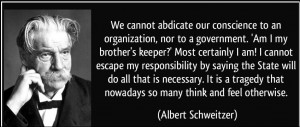In Jeremiah 5:28, the prophet describes the “fat cats” of Judah who make themselves wealthy at the expense of others. They abuse privilege and ignore responsibility of caring for others. Cain revealed this characteristic himself  when God asked him about his brother. Cain, like many good politicians, answered a question with a question. He said, “Am I my brother’s keeper?” God’s response to that was a definite “yes, of course you are” even though those words are not recorded in the text. The innocent blood of Cain’s victim cries out from the ground for justice. Shall not God deliver it? Of course He will. In Jeremiah 5:29, the prophet moves from charging the “fat cat” leaders of Israel with their guilt to pronouncing God’s response. He writes, “Shall I not punish them for these things? Declares the LORD, and shall I not avenge myself on a nation such as this?” As Cain’s question to God assumed a negative reply, God’s question in this verse assumes a positive reply; “of course I will judge them!”
when God asked him about his brother. Cain, like many good politicians, answered a question with a question. He said, “Am I my brother’s keeper?” God’s response to that was a definite “yes, of course you are” even though those words are not recorded in the text. The innocent blood of Cain’s victim cries out from the ground for justice. Shall not God deliver it? Of course He will. In Jeremiah 5:29, the prophet moves from charging the “fat cat” leaders of Israel with their guilt to pronouncing God’s response. He writes, “Shall I not punish them for these things? Declares the LORD, and shall I not avenge myself on a nation such as this?” As Cain’s question to God assumed a negative reply, God’s question in this verse assumes a positive reply; “of course I will judge them!”
God has to respond to all injustices as he did with Cain and Able. Ryken correctly observes, “The reason for this is that God himself is a Father to the fatherless and a Defender of the poor: ‘For the Lord your God is God of gods and Lord of lords.… He defends the cause of the fatherless and the widow, and loves the alien, giving him food and clothing’ (Deuteronomy 10:17–18). All true sons and true daughters of God show their love for their heavenly Father by being champions for the cause of the poor.”[1] We are charged with looking out for the welfare of those who cannot look out for themselves.
One of the important areas today in which we can care for those who cannot care for themselves is to take up the cause of the pre-born. You might what Jeremiah wrote in 1:5: “Before I formed you in the womb I knew you, and before you were born I consecrated you; I appointed you a prophet to the nations.” The helpless life in the womb is often the victim of violence at the very hands of those who should love and care for them. It is only a fetus, so much rubbish to simply be discarded. Ryken goes on in his commentary to say, “The living God…asks, ‘What are you doing to plead the case of the fatherless to win it, or to defend the rights of the poor?’ If you are not doing anything for orphans or for the destitute, then you are just one of the fat cats. Unless you are doing something already, it is time to do something about the poor…”[2]
[1] Philip Graham Ryken, Jeremiah and Lamentations: From Sorrow to Hope, Preaching the Word (Wheaton, IL: Crossway Books, 2001), 102.
[2] Philip Graham Ryken, Jeremiah and Lamentations: From Sorrow to Hope, Preaching the Word (Wheaton, IL: Crossway Books, 2001), 102.